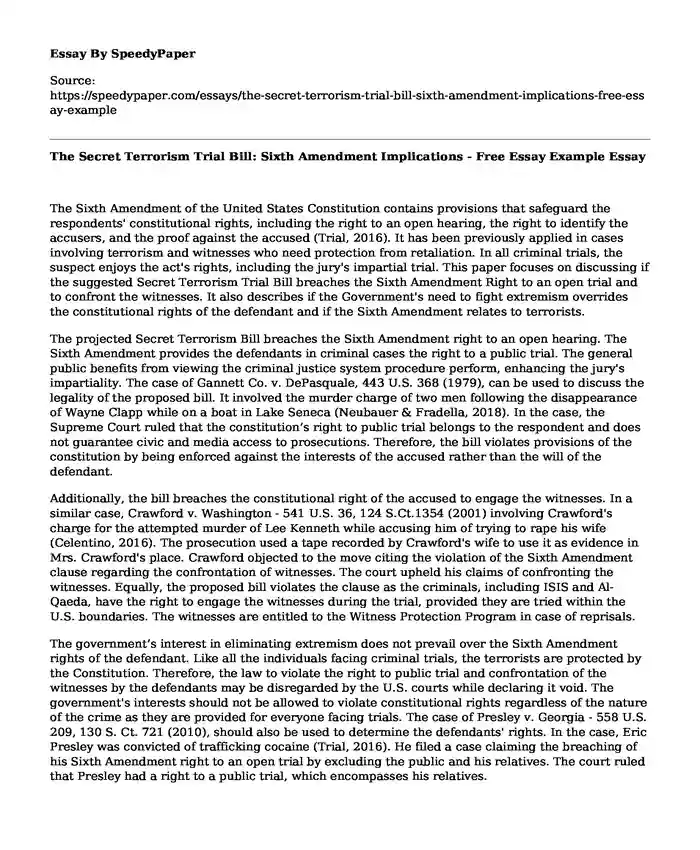
| Type of paper: | Essay |
| Categories: | Terrorism Constitution Criminal justice |
| Pages: | 3 |
| Wordcount: | 740 words |
The Sixth Amendment of the United States Constitution contains provisions that safeguard the respondents' constitutional rights, including the right to an open hearing, the right to identify the accusers, and the proof against the accused (Trial, 2016). It has been previously applied in cases involving terrorism and witnesses who need protection from retaliation. In all criminal trials, the suspect enjoys the act's rights, including the jury's impartial trial. This paper focuses on discussing if the suggested Secret Terrorism Trial Bill breaches the Sixth Amendment Right to an open trial and to confront the witnesses. It also describes if the Government's need to fight extremism overrides the constitutional rights of the defendant and if the Sixth Amendment relates to terrorists.
The projected Secret Terrorism Bill breaches the Sixth Amendment right to an open hearing. The Sixth Amendment provides the defendants in criminal cases the right to a public trial. The general public benefits from viewing the criminal justice system procedure perform, enhancing the jury's impartiality. The case of Gannett Co. v. DePasquale, 443 U.S. 368 (1979), can be used to discuss the legality of the proposed bill. It involved the murder charge of two men following the disappearance of Wayne Clapp while on a boat in Lake Seneca (Neubauer & Fradella, 2018). In the case, the Supreme Court ruled that the constitution’s right to public trial belongs to the respondent and does not guarantee civic and media access to prosecutions. Therefore, the bill violates provisions of the constitution by being enforced against the interests of the accused rather than the will of the defendant.
Additionally, the bill breaches the constitutional right of the accused to engage the witnesses. In a similar case, Crawford v. Washington - 541 U.S. 36, 124 S.Ct.1354 (2001) involving Crawford's charge for the attempted murder of Lee Kenneth while accusing him of trying to rape his wife (Celentino, 2016). The prosecution used a tape recorded by Crawford's wife to use it as evidence in Mrs. Crawford's place. Crawford objected to the move citing the violation of the Sixth Amendment clause regarding the confrontation of witnesses. The court upheld his claims of confronting the witnesses. Equally, the proposed bill violates the clause as the criminals, including ISIS and Al-Qaeda, have the right to engage the witnesses during the trial, provided they are tried within the U.S. boundaries. The witnesses are entitled to the Witness Protection Program in case of reprisals.
The government’s interest in eliminating extremism does not prevail over the Sixth Amendment rights of the defendant. Like all the individuals facing criminal trials, the terrorists are protected by the Constitution. Therefore, the law to violate the right to public trial and confrontation of the witnesses by the defendants may be disregarded by the U.S. courts while declaring it void. The government's interests should not be allowed to violate constitutional rights regardless of the nature of the crime as they are provided for everyone facing trials. The case of Presley v. Georgia - 558 U.S. 209, 130 S. Ct. 721 (2010), should also be used to determine the defendants' rights. In the case, Eric Presley was convicted of trafficking cocaine (Trial, 2016). He filed a case claiming the breaching of his Sixth Amendment right to an open trial by excluding the public and his relatives. The court ruled that Presley had a right to a public trial, which encompasses his relatives.
The Sixth Amendment also applies to terrorists. The clause states that it covers all criminal prosecutions on U.S. soil (Neubauer & Fradella, 2018). Terrorism is a crime like any other; therefore, terrorists have a right to a transparent and just prosecution. Involving the public and allowing the confrontation of the witnesses ensures making an unbiased ruling.
Conclusion
Conclusively, the Sixth Amendment safeguards the rights to a public trial and witness confrontation. Therefore, the terrorists have a right to open trial. They also have a right to confront their witnesses and ask questions. Thus, the projected Secret Trial Bill breaches the Sixth Amendment.
References
Celentino, J. C. (2016). Face-to-face with facial recognition evidence: admissibility under the post-Crawford Confrontation Clause. Michigan Law Review, 1317-1353. Retrieved from https://www.jstor.org/stable/24770906?seq=1
Neubauer, D. W., & Fradella, H. F. (2018). America's courts and the criminal justice system. Cengage Learning. Retrieved from https://www.cengagebrain.co.uk/shop/isbn/9781337557894
Trial, P. (2019). Sixth Amendment at Trial. Geo. LJ Ann. Rev. Crim. Proc; 775. Retrieved from https://heinonline.org/HOL/LandingPage?handle=hein.journals/anrvcpr48&div=32&id=&page=
Cite this page
The Secret Terrorism Trial Bill: Sixth Amendment Implications - Free Essay Example. (2023, Nov 07). Retrieved from https://speedypaper.net/essays/the-secret-terrorism-trial-bill-sixth-amendment-implications-free-essay-example
Request Removal
If you are the original author of this essay and no longer wish to have it published on the SpeedyPaper website, please click below to request its removal:
- Examples of Racial Profiling in a Free Essay from Our Database
- Essay Sample on Legal Issues in Criminal Courts
- Essay Sample about Mountains Beyond Mountains
- International Political Economy - Free Essay
- Essay Example: Racial Segregation in Commercial Ads
- Essay Example: United States Economy Transition From the Events Before Eve of the Civil War
- China and Market Reform: Paper Example
Popular categories




